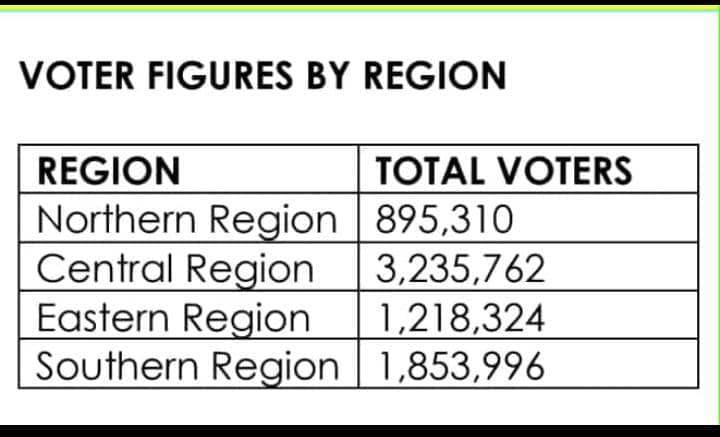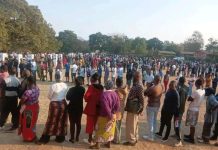By nyasatimes
Africa-Press – Malawi. With the Malawi Electoral Commission (MEC) confirming 7.2 million registered voters ahead of the 2025 polls, the numbers are beginning to tell a story of their own. A breakdown of registrations shows a familiar regional pattern that could shape the outcome of the election — and for the Democratic Progressive Party (DPP), the path to victory is possible, but narrow and heavily dependent on strategic alliances.
Central Region: The Mountain DPP Must Climb
The Central Region remains the political fortress of the ruling Malawi Congress Party (MCP), with 3,062,888 registered voters, accounting for about 40% of the national vote. History suggests that DPP has little room to maneuver here. Even in the best-case scenario, the opposition can only chip into pockets such as Dedza or Salima, but the numbers show that MCP’s hold is deep and commanding.
For DPP to stay in the race, it must accept heavy losses in the Centre but limit MCP’s dominance to around 70% rather than the 80% margins seen in past contests. Anything more could make recovery impossible.
Southern Region: DPP’s Lifeline
The Southern Region, with 1,853,994 voters, is where DPP’s hopes are anchored. The party has historically dominated Thyolo, Mulanje, Phalombe, Zomba, and Balaka. These five districts alone account for hundreds of thousands of loyal votes.
But the picture is not all rosy. The United Democratic Front (UDF) maintains strong influence in Mangochi and Machinga, while also competing in parts of Balaka. Without UDF cooperation, DPP risks a damaging split in the South and East, weakening its numbers significantly.
Analysts argue that DPP must secure at least 65–70% of Southern votes to offset losses in the Centre. That translates to more than 1.2 million votes from this region alone — achievable only if UDF is on board or kept from eroding DPP’s margins.
Eastern Region: A Battleground Where UDF Holds the Key
With 1,391,198 registered voters, the East is the classic swing space between DPP and UDF. Mangochi and Machinga are UDF’s traditional bedrock, while Ntcheu and Zomba lean towards DPP.
For DPP to edge toward State House, it must either absorb UDF’s base through an alliance or at least share it in a way that weakens MCP’s standing. If UDF contests alone and peels away 600,000 or more votes, it risks splitting the anti-MCP vote — handing MCP an easier path to re-election.
Northern Region: The Swing Factor Against DPP
The Northern Region has 895,310 registered voters, the smallest bloc but historically unpredictable. In 2019, the North leaned towards UTM, showing its willingness to shift allegiances.
This time, MCP’s choice of a running mate from the North presents a serious obstacle for DPP. The opposition must aim to capture at least 30–35% of Northern votes, or around 270,000 votes, to stay competitive. Anything below that, and the gap widens beyond repair.
The Math of a DPP Victory
For DPP to realistically win, the numbers would need to break down as follows:
Central Region (3,062,888): DPP secures ~25% → 765,000 votes
Southern Region (1,853,994): DPP secures ~70% → 1,297,000 votes
Eastern Region (1,391,198): DPP secures ~65% (with UDF alliance) → 904,000 votes
Northern Region (895,310): DPP secures ~35% → 313,000 votes
➡ Projected DPP Total ≈ 3.28 million votes (around 46–47% of the national tally).
With a split vote and regional dynamics, such a number could be enough to outpace MCP if UDF is fully behind DPP. Without UDF, however, DPP risks dropping closer to 2.5 million votes, well short of a majority.
Conclusion: A Coalition or Nothing
The arithmetic is clear. The Central Region is lost territory for DPP, the North is slipping away to MCP, and the South alone cannot deliver victory. The East, with UDF’s 600,000-strong base, becomes the make-or-break factor.
For the DPP, the 2025 election is not just a battle of votes but a battle of alliances. Without UDF, victory remains out of reach. With UDF, and a strong showing in its Southern heartland, the opposition can still stage a credible challenge for State House.
Source: Malawi Nyasa Times
For More News And Analysis About Malawi Follow Africa-Press






